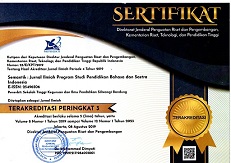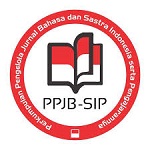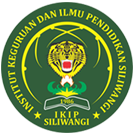GOOGLE SCHOLAR SEBAGAI SUMBER LITERASI DIGITAL DALAM MENULIS ARTIKEL ILMIAH DI PERGURUAN TINGGI
DOI:
https://doi.org/10.22460/semantik.v13i2.p175-186Keywords:
Google Scholar, Digital Literature, Academic WritingAbstract
The purpose of this study is to determine the difficulties of students in academic writing and the role of Google Scholar as a source of digital literacy. The research used is descriptive research with a qualitative approach. The research was conducted on students of class 2020 of Winaya Mukti University who were taking 50 thesis courses. This study used data collection techniques, interviews and questionnaires. The results are the difficulties faced by students in academic writing, namely not optimal ability and knowledge in academic writing, students find it difficult to find ideas, ideas and topics in the academic writing they will write, students find it difficult to develop academic writing systematics, and students have difficulty getting references from the internet articles that match the topic they choose. Google Scholar is very important as a digital reference source in academic writing. With the existence of Google Scholar, students are greatly helped in finding reference sources, thousands of articles with the same topics as those chosen by students cause students to no longer have difficulty in developing ideas or ideas from scientific articles. The existence of Google Scholar is also seen as easy in terms of time and cost.References
Ahmadi F, Y., & Fauziya, D. S. (2023). Desain model pembelajaran proyek berbantuan obs studio pada mata kuliah studi wacana berorientasi profil pelajar pancasila. Semantik, 12(1), 101–113. https://doi.org/10.22460/semantik.v12i1.p101-113
Azzahra, I. S. S., & Qudratullah. (2024). Pengembangan media literasiliwangi berbasis aplikasi podcast menuju mahasiswa dengan literasi unggul. Semantik, 13(1), 133–144. https://doi.org/10.22460/semantik.v13i1.p133-144
Balqis, A. R., Siregar, A. H., Fridalisa, A., & Maulana, M. F. (2023). Pemanfaatan google scholar dalam pencarian informasi. El-Mujtama: Jurnal Pengabdian Masyarakat, 3(3), 753–759. https://doi.org/10.47467/elmujtama.v3i3.2933
Budhyani, I. D. A. M., & Angendari, M. D. (2021). Kesulitan dalam menulis karya ilmiah. Mimbar Ilmu, 26(3), 400. https://doi.org/10.23887/mi.v26i3.40678
Davis, M. (2018). ‘If you don’t write yourself, on what grounds can you offer advice about writing to others?’ Perspectives on the importance of publishing by teachers of academic writing. Journal of Academic Writing, 8(2), 24–35. https://doi.org/10.18552/joaw.v8i2.459
Effendi, E., Alfina, S., Mutahar, L. F., Lubis, C. A., & Amelia, R. N. (2022). Stuktur menulis artikel ilmiah. Edukasi Nonformal, 3(2), 2715–2634.
Fuadin, A., & Fauziya, D. S. (2022). Implementasi model project based learning dalam mata kuliah wajib umum bahasa Indonesia. Semantik, 11(1), 101–110. https://doi.org/10.22460/semantik.v11i1.p101-110
Girgensohn, K. (2016). Students’ writing research as a tool for learning – insights into a seminar with research-based learning. Journal of Academic Writing, 6(1), 73–83. https://doi.org/10.18552/joaw.v6i1.281
Guo, L. (2022). Teachers’ mediation in students’ development of cognition and metacognition. Asia-Pacific Journal of Teacher Education, 50(5), 458–473. https://doi.org/10.1080/1359866X.2020.1846158
Habibi, H., Salleh, A. H., & Sarjit Singh, M. K. (2015). The effect of reading on improving the writing of EFL Students. Pertanika Journal of Social Sciences & Humanities, 23(4).
Hasanah, U., Islamiani Safitri, I., & Risma Delima Harahap, R. (2023). Analisis karakter gemar membaca terhadap kemampuan literasi digital siswa SMP. Semantik, 12(2), 189–202. https://doi.org/10.22460/semantik.v12i2.p189-202
Hernawan, H., Anshori, D. S., Syihabuddin, S., & Mulyati, Y. (2023). The ability to write scientific articles among university students views from five institutions in Indonesia. Scope : Journal of English Language Teaching, 8(1), 84. https://doi.org/10.30998/scope.v8i1.19506
Huber, M. M., Leach-López, M. A., Lee, E., & Mafi, S. L. (2020). Improving accounting student writing skills using writing circles. Journal of Accounting Education, 53, 100694. https://doi.org/10.1016/j.jaccedu.2020.100694
Husain, T. (2019). Analisis layanan google scholar sebagai bahan referensi terhadap kepuasan mahasiswa. Ultima InfoSys : Jurnal Ilmu Sistem Informasi, 10(1), 69–75. https://doi.org/10.31937/si.v10i1.1086
Kirchhoff, L. (2016). Motivation in the writing centre: A Peer tutor’s experience. Journal of Academic Writing, 6(1), 31–40. https://doi.org/10.18552/joaw.v6i1.282
Latifah, & Azzahra, S. S. (2022). Penggunaan Instrumen Asesmen Literasi Bermuatan Karakter Dengan Menggunakan Metode Link and Match Pada Mahasiswa Ikip Siliwangi. Semantik, 11(2), 215–228. https://doi.org/10.22460/semantik.v11i2.p215-228
Murniati, S. (2022). Kesalahan penerapan ejaan bahasa indonesia pada tugas akhir mahasiswa. Semantik, 11(1), 33–46. https://doi.org/10.22460/semantik.v11i1.p33-46
Noruzi, A. (2005) The New Generation of Citation Indexes. Libri 55(4), pp. 170–180 DOI:10.1515/LIBR.2005.170
Rafika, A. S., Putri, H. Y., & Widiarti, F. D. (2017). Analisis mesin pencarian google scholar sebagai sumber baru untuk kutipan. Journal CERITA, 3(2), 193–205. https://doi.org/10.33050/cerita.v3i2.657
Raisig, S., & Vode, D. (2016). A workshop to help students integrate sources into their writing. Journal of Academic Writing, 6(1), 222–251. https://doi.org/10.18552/joaw.v6i1.267
Rosdiana, L. A., Damaianti, V. S., Mulyati, Y., & Sastromiharjo, A. (2023). The role of metacognitive strategies in academic writing skills in higher education. International Journal of Learning, Teaching and Educational Research, 22(6), 328–344. https://doi.org/10.26803/ijlter.22.6.18
Rosdiana, L. A. (2021). Pengembangan model quantum writing yang berorientasi systematic literature review (SLR) dalam pembelajaran menulis artikel. LITERASI: Jurnal Ilmiah Pendidikan Bahasa, Sastra Indonesia Dan Daerah, 11(2), 84–92. https://doi.org/10.23969/literasi.v11i2.3523
Ruslan, I., Wibowo, A., & Lim, R. (2013). Website penelusuran artikel ilmiah dengan memanfaatkan parscit, google scholar dan mendeley api. Jurnal Infra, 1(2), 168-173.
Saidin, Sudirman, F. A., H, L. O. H., Asriani, Yusuf, M., Abdullah, A., & Amin, H. (2023). Pemanfaatan mendeley dan google scholar dalam sitasi karya ilmiah. Kongga : Jurnal Pengabdian Masyarakat, 1(1), 24–29. http://kongga.uho.ac.id/index.php/journal
Sakaria, S., Asdar, A., & Akbar, A. (2019). Pembelajaran menulis artikel opini berbasis proyek. Klasikal : Journal of Education, Language Teaching and Science, 1(2), 38–46. https://doi.org/10.52208/klasikal.v1i2.33
Septafi, G. (2021). Analisis kemampuan menulis artikel ilmiah mahasiswa pendidikan guru sekolah dasar angkatan 2019. Educational Technology Journal, 1(2), 1–16. https://doi.org/10.26740/etj.v1n2.p1-16
Slameto, S. (2016). Penulisan artikel ilmiah hasil penelitian tindakan kelas. Scholaria: Jurnal Pendidikan Dan Kebudayaan, 6(2), 46–57. https://doi.org/10.24246/j.scholaria.2016.v6.i2.p46-57
Susanti, R. H. (2023). Penulisan Karya Ilmiah sebagai Salah Satu Tools Meningkatkan Kemampuan Berpikir Kritis. https://doi.org/10.35141/jie.v6i1.652
Zulfadhli, M., Anshori, D. S., & Sunendar, D. (2023). Kebijakan pembelajaran MKWK bahasa Indonesia di perguruan tinggi: Implementasi dan tantangannya. Semantik, 12(1), 125–140. https://doi.org/10.22460/semantik.v12i1.p125-140.
Downloads
Published
Issue
Section
License

This work is licensed under a Creative Commons Attribution-ShareAlike 4.0 International License.
The author is responsible for acquiring the permission(s) to reproduce any copyrighted figures, tables, data, or text that are being used in the submitted paper. Authors should note that text quotations of more than 250 words from a published or copyrighted work will require a grant of permission from the original publisher to reprint. The written permission letter(s) must be submitted together with the manuscript.










